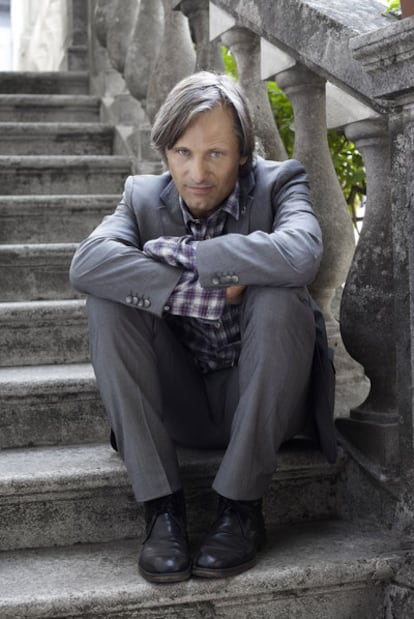"I'm attracted by what scares me"
Now acting on stage in Spain, Viggo Mortensen's new film sees him cast as Freud
Watching him slowly walking along the street, with his woolen cap, plastic bag of books and kindly face, nobody would say he was a Hollywood film star. For the moment, Viggo Mortensen has put aside the big film projects to shut himself inside Madrid's Matadero Theater and, with Carme Elías, star in Purgatorio, Ariel Dorfman's play about forgiveness and guilt. It marks his return to the stage after more than 20 years, and it's also the first time he's performed a play in Spanish, a language he learnt during his childhood in Argentina. The sold-out signs have already been hung outside the Matadero, but from Friday there's also the chance to catch him on the big screen in A Dangerous Method, his third collaboration with David Cronenberg, in which he portrays the great psychiatrist Sigmund Freud.
Bringing Purgatorio to the stage has not been an easy process. Nor a fast one. The play couldn't go ahead two years ago due to the illness of Mortensen's mother and rehearsals had to be suspended. "At the time it pained me to let down the actress, the theater, the public," the actor explains. "I needed to close the circle. I'm glad to have been able to do it, I feel good. Purgatorio is a complicated text, thorny, difficult, and I think now we have continued sharpening, perfecting. It's clear that sometimes it's worth the effort to wait for good things."
Mortensen, who talks calmly and thoughtfully, considers it an honor to tread the stage of the Matadero, where he has enjoyed "great actors and good productions." What led him to the theater? "Fear. I did theater because it scared me. I'm attracted to anything that scares me. It's not like cinema, where you do one take and then you can do another and another. The theater is one single live take of one hour and 40 minutes, depending on the performance. If you come off the rails, let's see how you get back on," he says.
Mortensen talks about the ideas of forgiveness and repentance that pulse behind Purgatorio. "Everything can be forgiven; another thing is whether you do it or not. It is not easy to forgive and I understand that there are people who cannot forgive, but are able to put up with everything. It's interesting to see how very conservative and Catholic people, for instance, criticized me and made comments saying that it was unforgivable that I said that ETA could be forgiven, when forgiveness is, I think, the most Christian feeling there is."
Aragorn in Lord of the Rings, evil Alatriste in Agustín Díaz Yanes' film, the anguished father in The Road: all of his characters are born out of exhaustive and obsessive work. Is this part of his success? "I don't know. Everyone has their own way of doing things. I love the preparation period, imagining the characters and playing like when I was a child. I think it's very useful to preserve that love, that pleasure in playing."
To play Freud he traveled to Vienna and read hundreds of books. He swapped dozens of emails with Cronenberg on the subject of the psychoanalyst's cigars alone. "With many other directors, that's not to say the majority, I'm not confident in being able to share what is such a personal and private preparation process. With Cronenberg, it's different. He understands that process and likes it. I know in advance that the shoot is going to be fun [...] and the film will be good. It is a guarantee."
His obsession leads him to search for the poetic side of everything he does. "There's always something tender inside people," he says. "They have all been children and a child does not start out being bad ? that never disappears from everything."
It brings to mind a phrase of Freud's: "Wherever I go I find a poet has been there before me."

Tu suscripción se está usando en otro dispositivo
¿Quieres añadir otro usuario a tu suscripción?
Si continúas leyendo en este dispositivo, no se podrá leer en el otro.
FlechaTu suscripción se está usando en otro dispositivo y solo puedes acceder a EL PAÍS desde un dispositivo a la vez.
Si quieres compartir tu cuenta, cambia tu suscripción a la modalidad Premium, así podrás añadir otro usuario. Cada uno accederá con su propia cuenta de email, lo que os permitirá personalizar vuestra experiencia en EL PAÍS.
¿Tienes una suscripción de empresa? Accede aquí para contratar más cuentas.
En el caso de no saber quién está usando tu cuenta, te recomendamos cambiar tu contraseña aquí.
Si decides continuar compartiendo tu cuenta, este mensaje se mostrará en tu dispositivo y en el de la otra persona que está usando tu cuenta de forma indefinida, afectando a tu experiencia de lectura. Puedes consultar aquí los términos y condiciones de la suscripción digital.








































